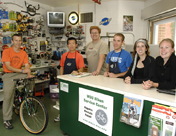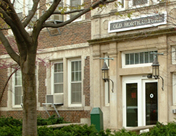Walking the Talk...How Green is MSU?
MSU is a nationally-recognized "green" university—for reasons that include campus operations as well as the curricular and programmatic innovations noted elsewhere in this issue. A few examples are included here.
LEED®-NC Rating System
The LEED®-NC (Leadership in Energy and Environmental Design—New Construction) green building rating system was developed by the U.S. Green Building Council, of which MSU is a member. LEED is a voluntary national rating system to support the development of high-performance, sustainable buildings. Criteria include sustainable sites, water efficiency, energy and atmosphere, materials and resources, indoor environmental quality, and innovation and design process. Major MSU renovation projects must comply with LEED standards. MSU "LEED" buildings include the Chemistry Building addition, the new MSU Surplus Store and Recycling Center, and the Kellogg Pasture-Based Dairy facility. For more information visit usgbc.org.

MSU Bikes Service Center staff.
MSU Bikes
The MSU Bikes Service Center promotes bicycling as a fun, economical, environmentally friendly, and healthy transportation alternative. MSU Bikes refurbishes abandoned and donated bicycles to rent or sell to the campus community. The yearround operation also offers full repair services, accessories, a free 24/7 air station, and safety and maintenance workshops. It advises university planners on future improvements to the campus infrastructure for better and safer bicycling. For more information visit bikes.msu.edu, e-mail bikes@msu.edu, or call (517) 432-3400.
Office of Campus Sustainability
The Office of Campus Sustainability fosters a collaborative learning culture that envisions MSU as a sustainable community, providing for the social and economic needs of its current and future members without compromising the health of the biosphere. Projects undertaken by the Office include a comprehensive assessment of economic, environmental, and social health indicators across campus (2003, updated 2007), as well as an online newsletter, calendar of events, and media center. The Office also leads an initiative to develop an internal Green Certification Program. For more information visit ecofoot.msu.edu.
Recycling and Waste Management
In January 2008 the MSU Board of Trustees authorized a new recycling facility to be located west of Farm Lane. A more comprehensive recycling program, coupled with the new facility, will allow the university to triple the amount of materials currently being recycled and expand recycling collection in all buildings. For more information visit recycle.msu.edu.
Did You Know...
MSU is piloting a plan to save money and reduce greenhouse gas emissions on campus without requiring major investments or drastic changes.

Old Horticulture Hall is one of the buildings used in MSU's classroom rescheduling program to reduce energy consumption.
During the 2008-2009 academic year, seven buildings participated in a pilot program to schedule evening classes and other events more efficiently. As a result of the project, energy reductions in the seven buildings ranged from 2 percent to 20 percent. This percentage decrease represents savings of 211 megawatt hours, 137 tons of carbon dioxide, and $16,904.
The easiest way to reduce energy consumption is to reduce the amount of time the heating, ventilation, and cooling (HVAC) system runs. In the past, many buildings have been kept open with the HVAC running during only one or two evening courses or events.
"We...simply relocated the classes to higher-utilized buildings nearby," said Lynda Boomer, energy and environmental engineer with the Physical Plant. Classes and other events were typically moved to a building next door or in the same geographic area.
The university will expand this program to include more buildings in the upcoming academic year. The classroom consolidation initiative was one of 50 recommendations produced by the Environmental Stewardship Initiative, "Be Spartan Green."
For more information, visit bespartangreen.msu.edu.
Adapted from a story by MSU Newsroom, June 24, 2009.